- Home
- Jack Kerouac
Visions of Gerard
Visions of Gerard Read online
PENGUIN BOOKS
VISIONS OF GERARD
Jack Kerouac was born in Lowell, Massachusetts, in 1922, the youngest of three children in a Franco-Canadian family. He attended local Catholic and public schools and won a football scholarship to Columbia University in New York City, where he met Neal Cassady, Allen Ginsberg, and William S. Burroughs. He quit school in his sophomore year and joined the Merchant Marine, beginning the restless wanderings that were to continue for the greater part of his life. His first novel, The Town and the City, appeared in 1950, but it was On the Road, first published in 1957 and memorializing his adventures with Neal Cassady, that epitomized to the world what became known as “the Beat generation” and made Kerouac one of the most controversial and best-known writers of his time. Publication of his many other books followed, among them The Dharma Bums, The Subterraneans, and Big Sur. Kerouac considered them all to be part of “one enormous comedy,” which he called The Duluoz Legend. “In my old age,” he wrote, “I intend to collect all my work and reinsert my pantheon of uniform names, leave the long shelf full of books, there, and die happy.” He died in St. Petersburg, Florida in 1969, at the age of forty-seven.
VISIONS OF GERARD
Jack Kerouac
PENGUIN BOOKS
PENGUIN BOOKS
Published by the Penguin Group
Penguin Books USA Inc.,
375 Hudson Street, New York, New York 10014, U.S.A.
Penguin Books Ltd, 27 Wrights Lane, London W8 5TZ, England
Penguin Books Australia Ltd, Ringwood, Victoria, Australia
Penguin Books Canada Ltd, 10 Alcorn Avenue,
Toronto, Ontario, Canada M4V 3B2
Penguin Books (N.Z.) Ltd, 182-190 Wairau Road,
Auckland 10, New Zealand
Penguin Books Ltd, Registered Offices:
Harmondsworth, Middlesex, England
First published in the United States of America by Farrar, Straus & Giroux, Inc., 1963 Published in Penguin Books 1991
10 9 8
Copyright © Jack Kerouac, 1958, 1959, 1963
Copyright © renewed Stella and Jan Kerouac, 1986, 1987
All rights reserved
LIBRARY OF CONGRESS CATALOGING IN PUBLICATION DATA
Kerouac, Jack, 1922–1969.
Vision of Gerard/Jack Kerouac.
p. cm.
Originally published in 1958.
ISBN 9781101548424
I. Title.
PS3521.E735V47 1991
813′.54—dc20 90–22198
Except in the United States of America, this book is sold subject to the condition that it shall not, by way of trade or otherwise, be lent, re-sold, hired out, or otherwise circulated without the publisher’s prior consent in any form of binding or cover other than that in which it is published and without a similar condition including this condition being imposed on the subsequent purchaser.
Gerard Duluoz was born in 1917 a sickly little kid with a rheumatic heart and many other complications that made him ill for the most part of his life which ended in July 1926, when he was 9, and the nuns of St. Louis de France Parochial School were at his bedside to take down his dying words because they’d heard his astonishing revelations of heaven delivered in catechism class on no more encourage ment than that it was his turn to speak—Saintly Gerard, his pure and tranquil face, the mournful look of him, the piteousness of his little soft shroud of hair falling down his brow and swept aside by the hand over blue serious eyes—I would deliver no more obloquies and curse at my damned earth, but obsecrations only, could I resolve in me to keep his fixed-in-memory face free of running off from me—For the first four years of my life, while he lived, I was not Ti Jean Duluoz, I was Gerard, the world was his face, the flower of his face, the pale stooped disposition, the heartbreakingness and the holiness and his teachings of tenderness to me, and my mother constantly reminding me to pay attention to his goodness and advice—Summers he’d lain a-afternoons, on back, in yard, hand to eyes, gazing at the white clouds passing on by, those perfect Tao phantoms that materialize and then travel and then go, dematerialized, in one vast planet emptiness, like souls of people, like substantial fleshy people themselves, like your quite substantial redbrick smokestacks of the Lowell Mills along the river on sad red sun Sunday afternoons when big scowling Emil Pop Duluoz our father is in his shirtsleeves reading the funnies in the corner by the potted plant of time and home—Patting his sickly little Gerard on the head, “Mon pauvre ti Loup, me poor lil Wolf, you were born to suffer” (little dreaming how soon it would be his sufferings’d end, how soon the rain, incense and teary glooms of the funeral which would be held across the way in St.Louis de France’s cellar-like basement church on Boisvert and West Sixth).
For me the first four years of my life are permeant and gray with the memory of a kindly serious face bending over me and being me and blessing me—The world a hatch of Duluoz Saintliness, and him the big chicken, Gerard, who warned me to be kind to little animals and took me by the hand on forgotten little walks.
“Allo zig lain—ziglain—zigluu—” he’d say to our cat, in a little high crazycatvoice and the cat’d look plain and blank back at him as though the cat language was the true one but also they understood the words to portend kindness and their eyes followed him as he moved around our gray house and suddenly they’d bless him unexpectedly by jumping on his lap at dusk, in the quiet hour when water’s burbling on the stove the starchy Irish potatoes and hushsilence fills ears in houses announcing Avalokitesvara’s blessed everlasting presence grinning in the swarming shadows behind the stuffed chairs and tasseled lamps, a Womb of Exuberant Fertility the world and the sad things in it laughable, Gerard the least and last to dis-acknowledge it I’d bet if he were here to bless my pencil as I undertake and draw breath to tell his pain-tale for the world that needs his soft and loving like.
“Heaven is all white” (le ciel yé tout blanc, in the little child patois we spoke our native French in), “the angels are like lambs, and all the children and their parents are together forever,” he’d tell me, and I: “Sont-ils content? Are they happy?”
“They couldnt be anything else but happy—”
“What’s the color of God?—”
“Blanc d’or rouge noir pi toute—White of gold red black and everything—” is the translation.
Lil Kitty comes up and gricks wet nose and teethies against Gerard’s outheld forefinger, “Whattayawant, Ploo pli?“—Would I could remember the huddling and the love of these forlorn two brothers in a past so distant from my sick aim now I couldnt gain its healing virtues if I had the bridge, having lost all my molecules of then without their taste of enlightenment.
He bundles me in the coat and hat, he’ll show me how to play in the yard—Meanwhile smoke sorrows from red dusk roofs in winter New England and our shadows in the brown frozen grass are like remembrances of what must have happened a million aeons of aeons ago in the Same and blazing Nirvana-Samsara Blown-Out-Turned-On light.
I do believe I remember the gray morning (musta been a Saturday) when Gerard showed up at the cottage on Burnaby Street (when I was 3) with the little boy whose name I cant forget and the consistency of it like lumps of gray mud, Plourdes—Balls of sorrow are his name—Sniveling at the nose which he had no handkerchief to blow, dirty, in a little holey sweater, Gerard himself in his long black parochial stockings and the highbutton shoes, they’re standing in the yard by the little wooden stoop in back of to the side where the meadows of sadness are faced (with their stand of gleary pines beyond and in which on rainy days I could see the beginning of the Indianface Fog)—G
erard wants Mama Ange to give the little boy Plourdes some bread and butter and bananas, “Ya faim, he’s hungry”—From a poor and ignorant family, likely, and they’d never feed him except at supper, or an occasional (perhaps) lard sandwich, Gerard was acute enough to realize the child was hungry and was crying on account of hunger and he knew the munificence of his own mother’s home and took him there unto and asked for food for him—Which my mother gave the boy, who now, years later, I see, or just saw, on a recent visit to Lowell, six feet tall and 200 pounds and a lot of bread and butter and bananas and child largesse has gone into the bulkying of his decaying mountain of flesh—A glimmer memory maybe in his truckdriver brain of the tiny sickling who mourned for him and fed him and blessed him in the long ago—Plourdes—A Canadian name containing in it for me all the despair, raw gricky hopelessness, cold and chapped sorrow of Lowell—Like the abandoned howl of a dog and no one to open the door—For Plourdes his fate, for me:—Gerard to open it to the Love of God, whereby, now, 30 years later, my heart, healed, is stillwarm, saved—Without Gerard what would have happened to Ti Jean?
I’m on the porch muffled in bundlings watching the little Christly drama—My mother goes in the kitchen and butters bread and peels bananas, with that heartbreaking, slow, fumbly motion of mothers of the world, like old Indian. Mothers who’ve pounded tortillas and boiled mush across clanks of millenniums and wind-howl—My heart is where it belongs.
My father comes home from work and hears the story and says “How he’s got a heart, that child!” shaking his head and biting his lips by the stove.
It was only many years later when I met and understood Savas Savakis that I recalled the definite and immortal idealism which had been imparted me by my holy brother—And even later with the discovery (or dullmouthed amazed hang-middled mindburnt waking re discovery) of Buddhism, Awakenedhood—Amazed recollection that from the very beginning I, whoever “I” or whatever “I” was, was destined, destined indeed, to meet, learn, understand Gerard and Savas and the Blessed Lord Buddha (and my Sweet Christ too through all his Paulian tangles and bloody crosses of heathen violence)—To awaken to pure faith in the bright one truth: All is Well, practice Kindness, Heaven is Nigh.
Gerard’s sad eyes first foretold it—In the dream already ended, which all this is—His face so tranquil and compassionate, various pictures of him we had, one in particular in front of me now, that was taken in his (probably) fifth year, on the porch of the Lupine Road house the which, when I recently visited it, revealed to me (to my infant’s old gaze) the ancient form of Earth-Beginnings in the form of a fluted porch-ceiling-light-globe that I had studied and studied with infant eyes long afternoons of drowse sun or warm March, in my crib—When, seeing it just recently, age 33, its contours rejoined me deeply with the long forgotten contours of Gerard’s face and peculiar soft hair, and little Raskolnik parochial shirt, and high black stockings—Nay, and unto the very brown slats of the house next door, and even more nay-worse-so unto the very stone “castle” on top of the hill a field away which I had completely forgotten in my rational memory and saw with awe in maturity what already I’d divined unconsciously in teenage reveries of “Doctor Sax and the Castle of the Great World Snake” all to be explained ahead in the Duluoz Legend—The said porch is the scene of the holy little snapshot here kept, Gerard sitting on the rail with my sister Nin (then 3), holding her hand, smirky-ing in the sun the two of them as some aunt or paternity godfather snaps the shot, the long forgotten snow of human hopes paling into browner stains in old photoisms—I see there in the eyes of Gerard the very diamond kindness and patient humility of the Brotherhood Ideal propounded from afar down the eternal corridors of Buddhahood and Compassionate Sanctity, in Nirmana (appearance) Kaya (form)—My own brother, a spot of sainthood in the endless globular Universes and Chillicosm—His heart under the little shirt as big as the sacred heart of thorns and blood depicted in all the humble homes of French-Canadian Lowell.
Behold: – One day he found a mouse caught in Scoop’s mousetrap outside the fish market on West Sixth Street—Faces more bleak than envenomed spiders, those who invented mousetraps, and had paths of bullgrained dullishness beaten to their bloodstained doors, and crowed in the sill—For that matter, on this gray morning, I can remember the faces of the Canucks of Lowell, the small tradesmen, butchers, butter and egg men, fishmen, barrelmakers, bums in benches (no benches but the oldtime sidewalk chair spitters by the dump, by banana peels steaming in the midday broil)—The hungjawed dull faces of grown adults who had no words to praise or please little trying-angels like Gerard working to save the mouse from the trap—But just stared or gawped on jawpipes and were silly in their prime—The little mouse, thrashing in the concrete, was released by Gerard—It went wobbling to the gutter with the fishjuice and spit, to die—He picked it tenderly and in his pocket sowed the goodness—Took it home and nursed it, actually bandaged it, held it, stroked it, prepared a little basket for it, as Ma watched amazed and men walked around in the streets “doin good for themselves” rounding up paper beyond their beans—Bums! all!—A thought smaller than a mouse’s turd directed to the Sunday Service Mass necessity, and that usually tinged by inner countings how much they’ll plap in th’basket—I dont remember rationally but in my soul and mind Yes there’s a mouse, peeping, and Gerard, and the basket, and the kitchen the scene of this heart-tender little hospital—“That big thing hurt you when it fell on your little leg” (because Gerard could really feel empathetically that pain, pain he’d had enough to not be apprentice at the trade and pang)—He could feel the iron snap grinding his little imagined birdy bones and squeezing and cracking and pressing harder unto worse-than-death the bleak-in-life—For it’s not innocent blank nature made hills look sad and woe-y, it’s men, with their awful minds—Their ignorance, grossness, mean petty thwarthings, schemes, hypocrite tendencies, repenting over losses, gloating over gains—Pot-boys, bone-carriers, funeral directors, glove-wearers, fog-breathers, shit-betiders, pissers, befoulers, stenchers, fat calf converters, utter blots & scabs on the face of it the earth—“Mouse? Who cares about a gad dam mouse—God musta made em to fit our traps”—Typical thought–I’d as soon drop a barrel of you-know-what on the roof of my own house, as walk a mile in conversation about one of them–I dont count Gerard in that seedy lot, that crew of bulls—The particular bleak gray jowled pale eyed sneaky fearful French Canadian quality of man, with his black store, his bags of produce, his bottomless mean and secret cellar, his herrings in a barrel, his hidden gold rings, his wife and daughter jongling in another dumb room, his dirty broom in the corner, his piousness, his cold hands, his hot bowels, his well-used whip, his easy greeting and hard opinion—Lay me down in sweet India or old Tahiti, I dont want to be buried in their cemetery—In fact, cremate me and deliver me to les Indes, I’m through—Wait till I get going on some of these other bloodlouts, for that matter—Yet not likely Gerard ever, if he’d have lived, would have fattened as I to come and groan about peoples and in plain print loud and foolish, but was a soft tenderhearted angel the likes of which you’ll never find again in science fictions of the future with their bleeding plastic penis-rods and round hole-machines and worries about how to get from Pit to Pisspot which is one millionth of a billionth of an inch further in endlessness of our gracious Lord than the earth speck (which I’d spew) (if I were you) (Maha Meru)—Some afternoon, Gerard goes to school—It had been on a noontime errand when sent to the store to buy smoked fish, that he’d found the mouse–Now, smiling, I see him from my overstuffed glooms in the parlor corner walking up Beaulieu Street to school with his strapped books and long black stockings and that peculiar gloomy sweetness of his person that was all things to me, I saw nothing else—Happy because his mouse was fed and repaired and safe in her little basket—Innocent enough comes our cat in the mid drowses of day, and eats, and leaves but the tail, enough to make all Lowell Laugh, but when Gerard comes home at 4 to see his tail-let in the bottom of the poor little bask
et he’d so laboriously contrived, he cried—I cried too.
My mother tried to explain that it wasnt the cat’s fault and nobody’s fault and such was life.
He knew it wasnt the cat’s fault but he took Nanny and sat her on the rocking chair and held her jowls and delivered her an exhortation no less:
“Méchante! Bad girl! Dont you understand what you’ve done? When will you understand? We dont disturb little animals and little things! We leave them alone! We’ll never go to heaven if we go on eating each other and destroying each other like that all the time!—without thinking, without knowing!—wake up, foolish girl!—realize what you’ve done!—Be ashamed! shame! crazy face! stop wiggling your ears! Understand what I’m tellin you! It’s got to stop some fine day! There wont always be time!—Bad girl! Go on! Go in your corner! Think it over well!”
I had never seen Gerard angry.
I was amazed and scared in the corner, as one might have felt seeing Christ in the temple bashing the moneychanger tables every which away and scourging them with his seldom whip.
When my father comes home from his printing shop and undoes his tie and removes 1920’s vest and sits himself down at hamburger and boiled potatoes and bread and butter of the prime with the kiddies and the good wife, the proposition is put up to him why men be so cruel and mice betrayed and cats devour the rest—Why we were made to suffer and be harsh in return, one the other, and drop turds of iron on brows of hope, and mop up sick yards and sad—“I’ll tell you, Ti Gerard, little one, in life it’s a jungle, man eats man either you eat or get eaten—The cat eats the mouse, the mouse eats the worm, the worm eats the cheese, the cheese turns and eats the man—So to speak—It’s like that, life—Dont cry and dont bother your sweet lil head over these things—All right, we’re all born to die, it’s the same story for everybody, see? We eat the cow and the cow gives us milk, dont ask me why.”

 Tristessa
Tristessa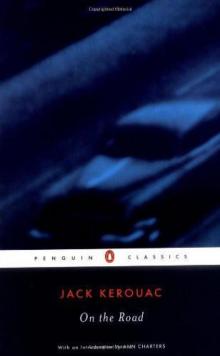 On the Road
On the Road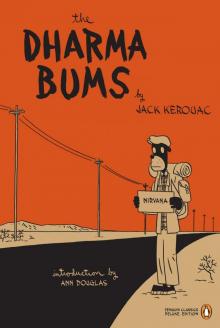 The Dharma Bums
The Dharma Bums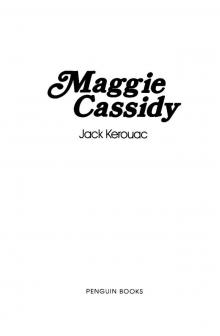 Maggie Cassidy
Maggie Cassidy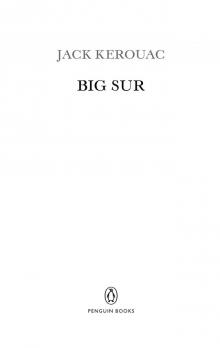 Big Sur
Big Sur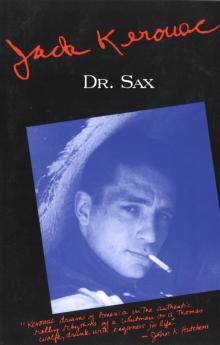 Dr. Sax
Dr. Sax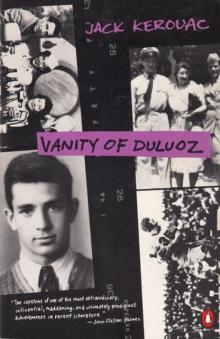 Vanity of Duluoz: An Adventurous Education, 1935-46
Vanity of Duluoz: An Adventurous Education, 1935-46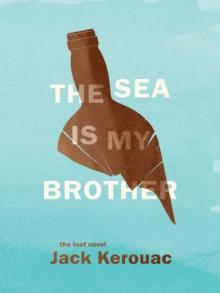 The Sea Is My Brother
The Sea Is My Brother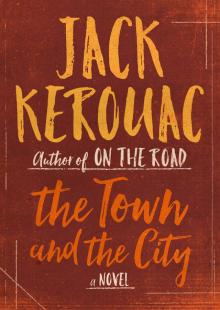 The Town and the City: A Novel
The Town and the City: A Novel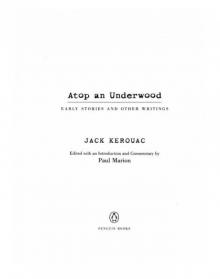 Atop an Underwood: Early Stories and Other Writings
Atop an Underwood: Early Stories and Other Writings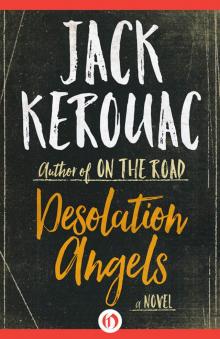 Desolation Angels: A Novel
Desolation Angels: A Novel Book of Sketches
Book of Sketches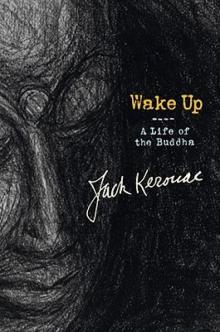 Wake Up: A Life of the Buddha
Wake Up: A Life of the Buddha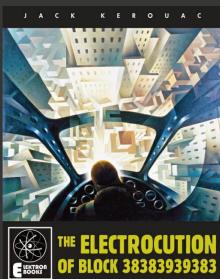 The Electrocution of Block 38383939383
The Electrocution of Block 38383939383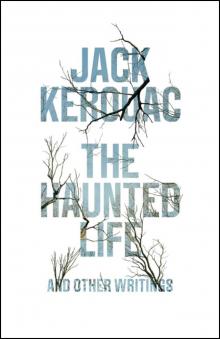 Haunted Life
Haunted Life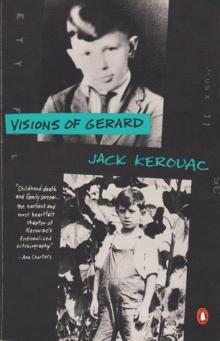 Visions of Gerard
Visions of Gerard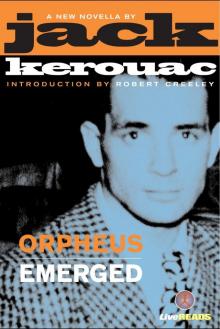 Orpheus Emerged
Orpheus Emerged Book of Blues
Book of Blues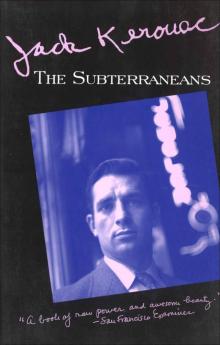 The Subterraneans
The Subterraneans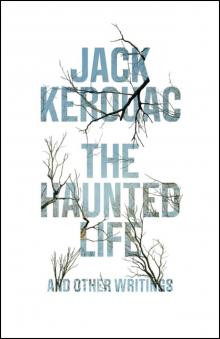 The Haunted Life
The Haunted Life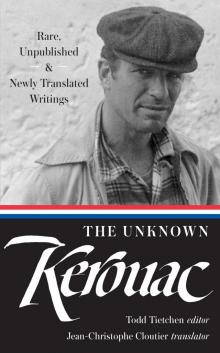 The Unknown Kerouac
The Unknown Kerouac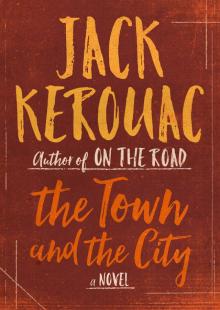 The Town and the City
The Town and the City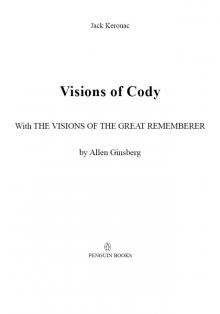 Visions of Cody
Visions of Cody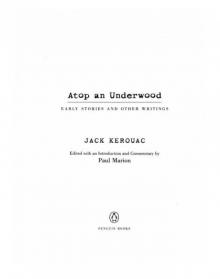 Atop an Underwood
Atop an Underwood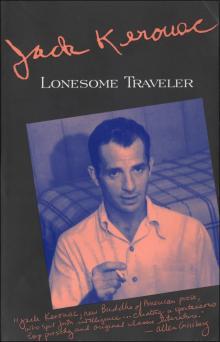 Lonesome Traveler
Lonesome Traveler Jack Kerouac and Allen Ginsberg
Jack Kerouac and Allen Ginsberg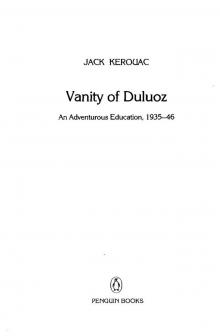 Vanity of Duluoz
Vanity of Duluoz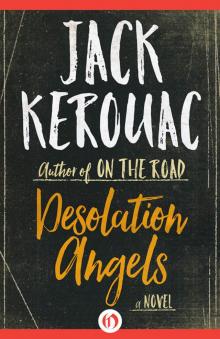 Desolation Angels
Desolation Angels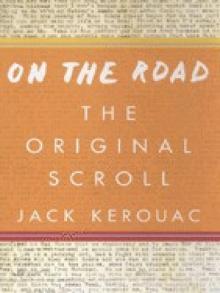 On the Road: The Original Scroll: (Penguin Classics Deluxe Edition)
On the Road: The Original Scroll: (Penguin Classics Deluxe Edition)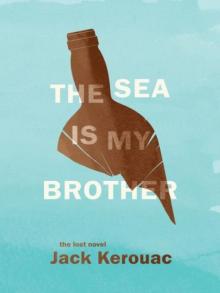 The Sea Is My Brother: The Lost Novel
The Sea Is My Brother: The Lost Novel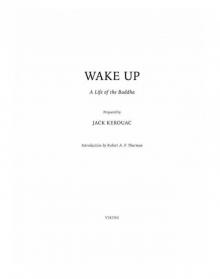 Wake Up
Wake Up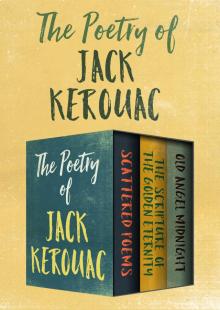 The Poetry of Jack Kerouac
The Poetry of Jack Kerouac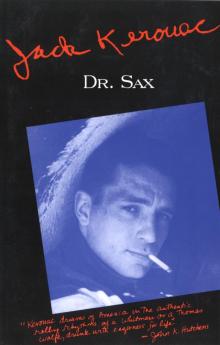 Doctor Sax
Doctor Sax